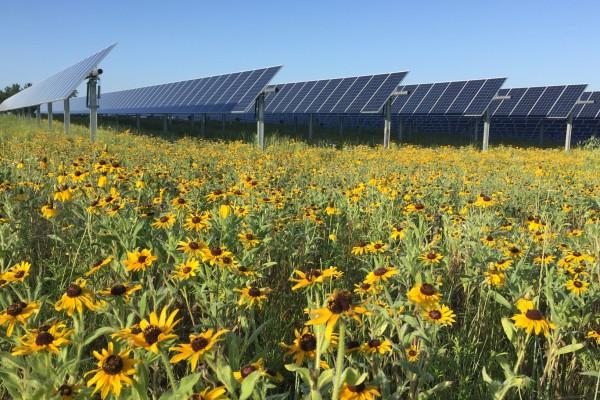Restoring Pollinator Habitats is Key to Feeding the Future
By Martin Mundo | SVP, General Merchandise Manager, Produce and Global Produce Sourcing, Walmart U.S.

Imagine mornings without orange juice, summer picnics without strawberries or holiday dinners without apple pie. Such a future is possible if we don’t take collective action to begin restoring pollinator habitats around the world.
It’s estimated that one out of every three bites of food we eat is possible because of animal pollinators. Bees are the most popular pollinators, but there’s an entire segment of the animal kingdom that helps pollinate the food we eat, including some that grow in our own home gardens. Pollinators include butterflies and moths, birds, bats, beetles and many more, and without them some of our favorite foods wouldn’t exist.
Yet studies show these vital pollinator populations have been declining over the last 30 years due to loss of habitat, pests, pollution, pesticides and a changing climate, among other contributing factors.
To help improve pollinator health and biodiversity in the regions in which we operate, Walmart U.S. is announcing new pollinator commitments that will further our efforts to help reverse nature loss and ultimately bring us closer to meeting new nature commitments made by Walmart and the Walmart Foundation. We have invited our suppliers, stakeholders and customers to join us on this journey as we continue to take action to help protect our planet.
These new commitments serve as the largest pollinator health effort from a U.S. grocery retailer to-date, aiming to reduce several pollinator threats through promoting integrated pest management (IPM) practices and improving and expanding pollinator habitats.
Integrated Pest Management
One of the contributors to pollinator decline is the use of pesticides. Pollinator exposure to pesticides can be reduced by minimizing the use of pesticides, incorporating alternative forms of pest control and adopting a range of specific application practices through an Integrated Pest Management system. Therefore, Walmart U.S. is committing to source 100% of the fresh produce and floral we sell in our in-store produce department from suppliers that adopt IPM practices, as verified by a third-party, by 2025 (see full list of third-party certifications on Walmart’s Sustainability Hub).
We are also encouraging fresh produce suppliers to phase out use of chlorpyrifos and nitroguanidine neonicotinoids pesticides (where applicable unless mandated otherwise by law), avoid replacing them with other products with a level I bee precaution rating and assess and report annual progress.
Improve and Expand Pollinator Habitats
Pollinators are fundamental for around 80% of all flowering plants and more than three-quarters of the food crops that feed us. To help improve and expand pollinator habitats, Walmart U.S. will encourage fresh produce suppliers to protect, restore or establish pollinator habitats by 2025 on at least 3% of land they own, operate and/or invest in and report annual progress. We will also continue to avoid selling invasive plant species in our retail stores (based on recognized regional lists). And we will work with local organizations to protect, restore or establish pollinator habitats in major pollinator migration corridors.
For example, expanding upon our pollinator garden pilot, the “Big Nature” landscape of Walmart’s future Home Office campus will support local populations of plant pollinators. In particular, meadows planted near lakes will provide ample undisturbed pollinator foraging habitat as well as important water access and the potential for more intentional nesting habitat spaces for insects, small animals and birds.
In addition, we have partnered with solar developers to establish pollinator habitats around solar panel arrays like the one at our distribution center in Laurens, South Carolina, and through Walmart’s lead participation on community solar farms across Minnesota. We will continue to look for opportunities to establish more pollinator habitats where feasible. Finally, the Walmart Foundation recently granted funding to the Cornell Lab of Ornithology and the Cornell Atkinson Center for Sustainability to leverage citizen science data to monitor pollinators more cost-effectively, unlocking opportunities to improve conservation planning, farm practices and landscape management in the United States.
To help educate and engage our customers about pollinator plants for home gardens, Walmart U.S. is encouraging suppliers to label pollinator-friendly plants as attractive to pollinators in our retail locations. Starting this month, plants that attract pollinators will feature special tags to help customers grow their own pollinator gardens. In total, more than 1.3 million annual and perennial pollinator-promoting plants will carry tags in Walmart stores this spring (see labeling criteria on Walmart’s Sustainability Hub).
Driving the scale of our collective pollinator commitments through our supply chain can create industry-leading changes and have a significant positive impact for the future of our planet. It can also help prevent mornings without orange juice and summer picnics without strawberries – as long as we work together to protect the pollinators that serve the earliest roles in getting some of our favorite foods from farm to table.

